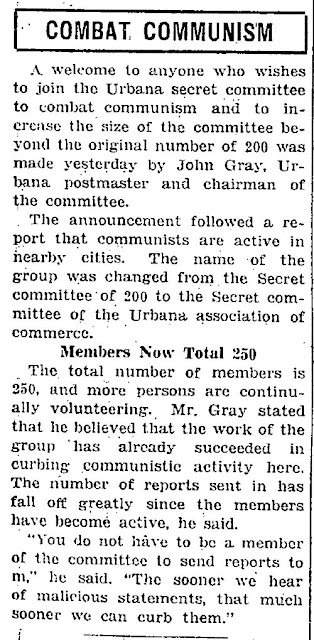This post includes local letters of opposition to the Klan that are important for the record and full account of this moment in history. The vocal opposition may have often been small or tempered, but it was relevant then and today. The 1925 local elections in Mattoon, Il may have been a personal loss for Reverend Jesse Forrest McMahan when it came to his run for school board president. But he was also credited with the mayoral victory that brought us the above headline from the 4/22/1925 Mattoon Journal-Gazette. The article explains McMahan's role in the campaign:
The article notes the mayor-elect had Klan support in spite of being a Democratic Party candidate. This may seem like an odd point to highlight to those who associate the Klan primarily with the Democratic Party, especially the original Klan and southern Klan history. In the north and especially the Midwest, the Klan was commonly a part of Republican politics. As noted previously here, the Exalted Cyclops of the Champaign County Ku Klux Klan was a prominent Republican.
Charles G. Palmer, the Grand Dragon of the Illinois Klan matter-of-factly boasted of the Klan's dominance in Illinois politics in the 10/24/1924 Chicago Tribune. The Klan was openly supporting Republican candidate and Governor Len Smalls. Infamous Klan raider S. Glenn Young stumped for Republican candidates, though not without causing a stir:
NPR had an overview of the nuance of Illinois politics during the 2nd Klan here with helpful citations. Excerpt:
The Southern Poverty Law Center, which tracks hate groups, says four to seven million men and women throughout the country joined the Klan in the 1920s. Among them, were up to 200,000 Illinoisans, and they were political.
A Chicago Klan newspaper called, “Dawn: A Journal for True American Patriots,“ encouraged members to recommend candidates and run for office.
The June sixth, 1923 Rockford paper, the Republic, reported:
“The klan is said to have been active in Springfield elections since last fall, supporting candidates backed by (Republican) Governor Len Small.”
Tension over the Klan’s involvement with Illinois government peaked that year. Chicago Representative Thomas J. O’Grady, a Democrat, requested an investigation into Statehouse employees’ Klan membership.
More at the full article here. The "Klan question" was a fairly divisive issue within both major parties' 1924 political conventions. The divisions and infighting among Klan and anti-Klan Democrats was a notorious party disaster for their convention that year. The Republican convention avoided taking a stand for or against Klan candidates. The Courier had coverage explaining the pragmatic political decision on 5/23/1924:
An editorial in the Courier on 9/10/1924 highlighted the political advantage of avoiding a fight on the issue in states where the Klan was more dominant in the Republican Party. In this example, the Courier lamented the influence of groups like the Klan and disputed whether such overt support helped or hurt Republican wins in Maine:
Indiana political trends and influence are probably more relevant here, especially as we see a lot of cross-over, both physically and organizationally across the boarder with Klan leaders in East Central Illinois. From the 6/6/1924 Courier:
This is the national and regional context for Klan politics heading into the local 1925 elections. And also just prior to some of the more headline grabbing scandals and attention the Klan would receive that year. This isn't an indictment of one party over another. The Klan had varying influence in both major parties at the local and national levels. There was also varying levels of opposition within each party. Letters to the editor in the Mattoon Journal-Gazette help highlight some of that contemporary opposition locally. These letters help show that some people at the time "knew better" and openly opposed the Klan, even while most may have remained silent, complicit, or welcoming of the Klan. From 4/7/1925:
From the 4/9/1925 Journal-Gazette (click to enlarge):
And the 4/10/1925 Journal-Gazette:
McMahan lost the school board race by roughly 600 votes, a pretty decent margin in a smaller local election, especially considering how the mayoral race went later. From the 4/13/1925 Journal-Gazette:

















No comments:
Post a Comment